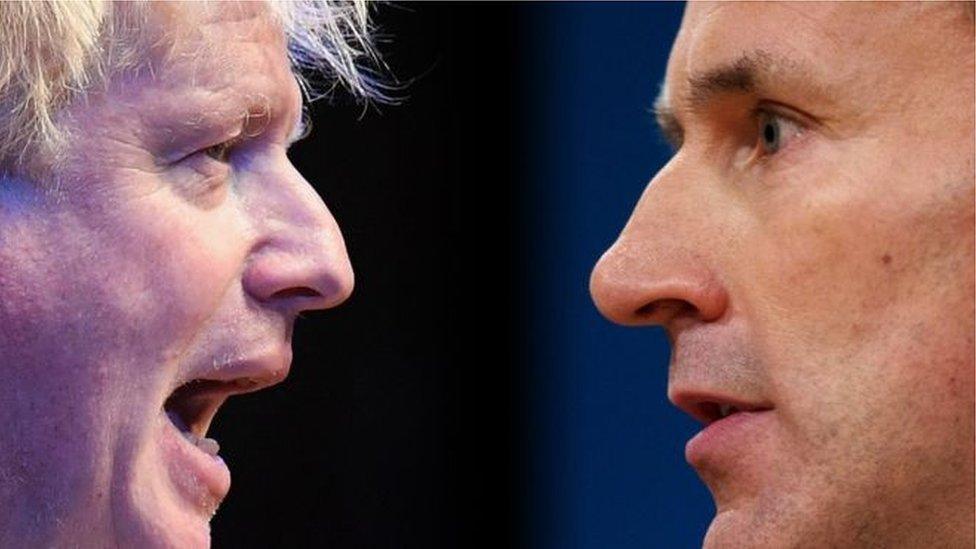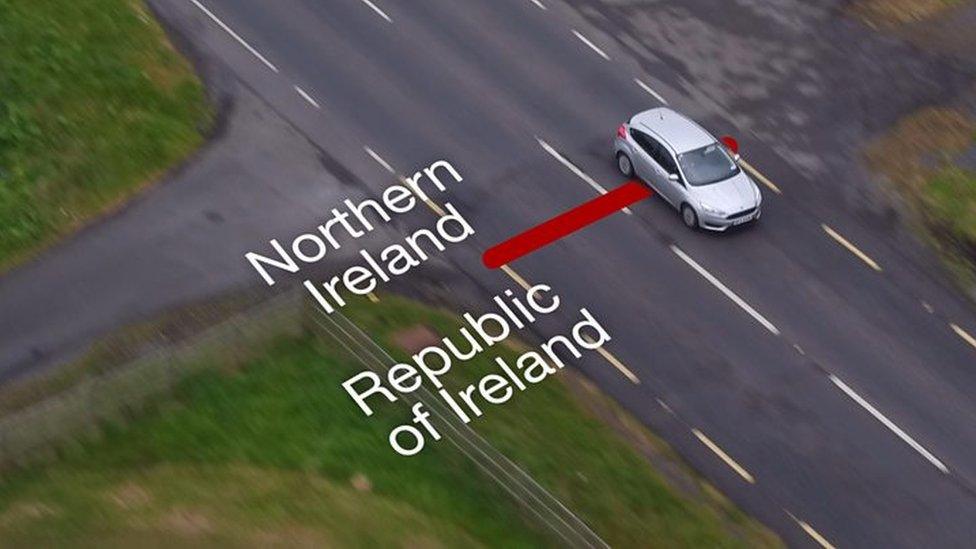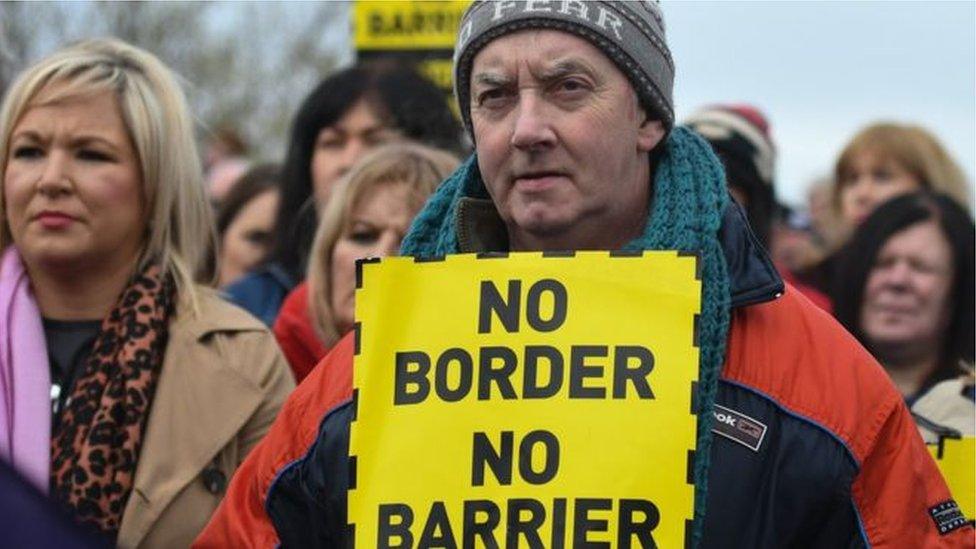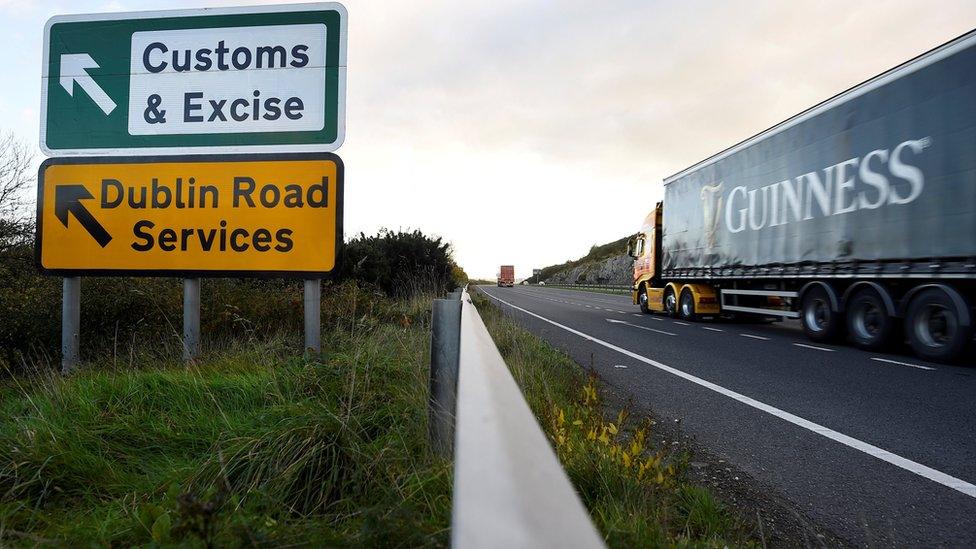How the PM hopefuls view Brexit and the border
- Published
- comments

Boris Johnson and Jeremy Hunt are pitching to Conservative Party members in Northern Ireland as they battle to become the next prime minister.
But what are their plans for Brexit, the backstop and the border?
Both men have been clear that the backstop should be removed from the withdrawal deal, or at least radically changed.
The backstop was the most controversial part of the deal Theresa May negotiated with the EU.
What is the backstop?
It is a position of last resort to prevent any new checks or controls on the Irish border after Brexit.
The UK and EU would prefer to maintain the border status quo through a comprehensive trade deal.

If such an agreement cannot be reached, or if a technological solution does not emerge, the backstop would come into force.
It would keep the UK in a single customs territory with the EU, and leave Northern Ireland in the EU's single market for goods.
That would mean goods crossing the border would not be subject to checks for customs or product standards.
Many Conservative MPs fear the UK could be "trapped" in that arrangement for years, leaving it unable to strike its own trade deals on goods with the rest of the world.
The Democratic Unionist Party (DUP), which props up the government, also do not want to see Northern Ireland treated differently from the rest of the UK.
How would the candidates change it?
Both men say they would seek a renegotiation, although EU leaders have consistently said the withdrawal deal will not be reopened and the backstop must remain in place.
Jeremy Hunt has suggested EU leaders have told him privately that they would be prepared to look again at "the whole package" if the UK has some new ideas.
He would add the DUP to his negotiating team and give three weeks for talks with the EU and then decide by 30 September whether a deal can be done.
Mr Johnson has suggested that the backstop be removed from the withdrawal deal and the Irish border issue be resolved in the second phase of Brexit talks which concern a trade deal.
He told the Sunday Times that is "logically" where the border should be discussed "and where it should have been all along".
That would have to involve some sort of standstill agreement to ensure no change at the border while the final deal is worked on.
Both men are agreed that a deal on so-called alternative arrangements is the key to replacing the backstop.
What are alternative arrangements?
Alternative arrangements are ways of maintaining a soft border without regulatory alignment between the UK and the EU.
It is normally used to refer to a package of technical, technological and administrative solutions.
A lengthy alternative arrangements plan, external was recently published by the Prosperity UK think tank.
It was praised by both candidates.
Mr Hunt described it as a "useful and thorough contribution," while Mr Johnson said it demonstrated that there were "plenty of checks that you can do away from the border if you had to do them without any kind of hard infrastructure at the Northern Ireland frontier."
However, the Prosperity UK report makes a number of assumptions which are worth examining.
Firstly, there is an important definition, or redefinition. In 2017, the EU-UK joint report said the UK was committed to avoiding a hard border, external, including any physical infrastructure or related checks and controls.
The EU view was this meant the status quo must be maintained with no new procedures at all relating to the border. The UK appeared to go along with this.
However the Prosperity UK report essentially concludes this is too restrictive and it should only mean no new checks and controls at the border.
The inevitable checks and controls will happen elsewhere.
There is also the expectation that the Irish government, political nationalism and some businesses would have to take a bit of pain.

The Irish government would have to back down on no checks and controls, nationalism would have to accept a new distinction between the two states and some Northern Ireland traders would have to bear new costs and trade frictions.
The report also suggests that on the very tricky issue of food standards the best, perhaps only, solution is to have some system of shared rules.
It alights on a convoluted UK-Irish food standards zone, which they say will be 'difficult' to negotiate.
That is perhaps an understatement as it would seem to compromise Ireland's place in the EU single market.
So alternative arrangements are not straightforward.
Mr Johnson has acknowledged they do not provide a "single magic bullet" while Mr Hunt says they can only work with "goodwill and flexibility on all sides."
What has the EU said about this?
The EU has committed to exploring alternative arrangements, but only once a withdrawal agreement containing the backstop is passed.
At a recent EU summit, the Taoiseach (Irish prime minister) said that alternative arrangements would not be able to replace the backstop in time for the UK's planned exit date.
Leo Varadkar said: "We can't accept that alternative arrangements are an alternative to a backstop unless we see what they are, know how they would work and see them demonstrated."
"That hasn't been done yet and I don't see that being done this side of October 31, which is why we certainly can't accept the deletion of the backstop."
- Published16 October 2019

- Published24 June 2019
